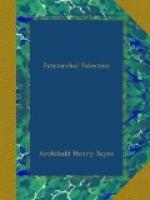Jacob and his family travelled in wagons along the high-road which connected the south of Palestine with the Delta. It led past Beer-sheba and El-Arish to the Shur, or line of fortifications which protected the eastern frontier of Egypt. The modern caravan road follows its course most of the way. It was thus distinct from “the way of the Philistines,” which led along the coast of the Mediterranean, on the northern edge of the Sirbonian Lake. In Egypt the Israelitish emigrants settled not far from the Hyksos capital in the land of Goshen, which the excavations of Dr. Naville have shown to be the Wadi Tumilat of to-day. Here they multiplied and grew wealthy, until the evil days came when the Egyptians rose up against Semitic influence and control, and Ramses II. transformed the free-born Beduin into public serfs.
But the age of Ramses II. was still far distant when Jacob died full of years, and his mummy was carried to the burial-place of his fathers “in the land of Canaan.” Local tradition connected the name of Abel-mizraim, “the meadow of Egypt,” on the eastern side of the Jordan, with the long funeral procession which wended its way from Zoan to Hebron. We cannot believe, however, that the mourners would have so far gone out of their road, even if the etymology assigned by tradition to the name could be supported. The tradition bears witness to the fact of the procession, but to nothing more.
With the funeral of Jacob a veil falls upon the Biblical history of Canaan, until the days when the spies were sent out to search the land. Joseph was buried in Egypt, not at Hebron, though he had made the Israelites swear before his death that his mummy should be eventually taken to Palestine. The road to Hebron, it is clear, was no longer open, and the power of the Hyksos princes must have been fast waning. The war of independence had broken out, and the native kings of Upper Egypt were driving the foreigner back into Asia. The rulers of Zoan had no longer troops to spare for a funeral procession through the eastern desert.




